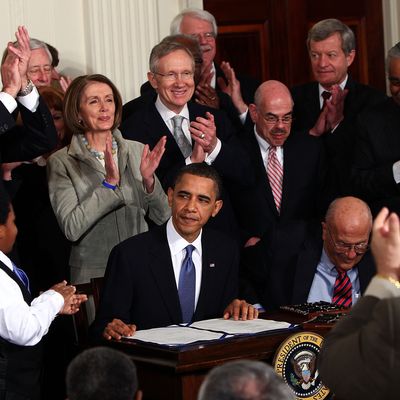
The most common fallacy of journalism, and one of the most common fallacies of the human brain in general, is the assumption that whatever is happening at the moment will continue to happen forever. That has been the implicit assumption of the hyperventilating coverage of the miserable Obamacare rollout. That fallacy is the explicit premise of one such story today, which asserts, “The lesson of the last six weeks is that when it comes to the Obamacare rollout, if it can go wrong, it probably will.” Fittingly, that piece appears in Politico, a publication for whom the overmagnification of recent trends is its essential credo.
It is always possible that the most recent Obamacare trend line will continue ad infinitum. More likely, things will round back into normalcy. A few points to keep in mind:
Obamacare has existed for more than six weeks. This fact may shock those of you who are either fruit flies or dedicated Politico junkies, but it is true. The law does many things, and some of them occurred prior to October 1.
One of the most important changes in the law is a huge collection of bureaucratic nudges designed to incentivize the health-care system toward delivering higher value rather than churning out higher cost. That experiment, while still extremely early, is going far better at this stage than even the most optimistic advocates hoped. A wave of innovation is in full bloom, manifesting itself in such things as lower rehospitalization rates, rapid growth of accountable care organizations and retail health providers, and employers shopping around for less expensive plans rather than endlessly footing higher bills.
And while the consumer rollout of the health exchanges has been an unmitigated disaster, the insurance response went much better than expected. The hated Obamacare central-planning bureaucrats tried to predict the cost of insurance plans under the new exchanges, and they turned out to have erred on the side of pessimism. The product on offer turns out to be significantly cheaper than initially expected — which is to say, the private sector has bet on the exchanges working.
Even the lessons of the last six weeks are more ambiguous than you might think. Medicaid is signing up customers rapidly — some of whom were eligible even before Obamacare and didn’t realize it, but enrolled owing to publicity from the new law.
What’s more, as Jonathan Cohn carefully shows, the victims of Obamacare — people in the individual market forced to buy more expensive plans — are almost certainly far fewer than widely believed. There are several reasons for this, as he explains: Individual plan holders tend to cycle in and out of the market quickly, they don’t always know the fine-print limitations of their plans, and they don’t yet know what alternative they can get in the new exchanges. But it’s likely most people who have insurance in the individual market will be better off (not to mention, the uninsured will be, too).
Democrats remain unified behind Obamacare. The feeding-frenzy atmosphere has reached a point where the National Journal will publish a story by conservative writer Josh Kraushaar arguing that Democrats in Congress are fleeing the law, and edging toward support for repeal. In fact, the opposite is occurring. Thirty-nine Democrats in the House voted for Fred Upton’s “keep your plan” bill, which truly would undermine the law. But that was a free vote on a bill that’s going nowhere anyway. Why not vote for it and help insulate yourself from the political fallout from plan cancellations?
Kraushaaer argues that there’s a potential coalition for the repeal of Obamacare, consisting of the Democrats who cast meaningless votes for Upton, plus Democrats who voted against it but “released harsh statements criticizing Obamacare.” I don’t mean to disillusion anybody, but sometimes members of Congress pander to voters with rhetoric that you can’t take fully at face value. True story!
The website is kind of working already. Lost in the Keep Your Plan imbroglio, it appears that healthcare.gov has already reached a point of functionality. It can currently handle 20–25,000 simultaneous users. That may or may not qualify as a full Hanukkah Miracle fixed website by the end of the month, but it’s probably enough, at the very least, to let the law muddle through.
All sorts of things will happen to Obamacare in the next few months. At least some of those things will be bad, because any large enough enterprise, public or private, has bad things happen. One thing that can be predicted is that more and more people will start signing up for Obamacare between now and the end of March, which means the constituency for the law will steadily grow. There will still be a constituency against the law, and possibly future failures will enlarge it, too.
But at some point, having state exchanges where people buy private insurance, with rules preventing abusive practices, will simply be part of the backdrop of health insurance. Take, say, the police. Police departments across the country are constantly beating up innocent people and letting criminals run wild. There will never be an end to stories of police corruption and incompetence. But most people simply take stories like that as reasons to try to make the policy work better, not as arguments that having a police department is a conceptual failure.






























